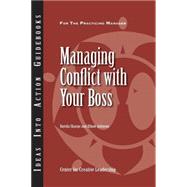
Note: Supplemental materials are not guaranteed with Rental or Used book purchases.
Purchase Benefits
Looking to rent a book? Rent Managing Conflict with Your Boss [ISBN: 9781882197705] for the semester, quarter, and short term or search our site for other textbooks by Unknown. Renting a textbook can save you up to 90% from the cost of buying.
Davida Sharpe is a senior faculty member at CCL, and has worked with such organizations as Verizon Communications, Catholic Healthcare Partners, and the Sara Lee Corporation. During her eight years at CCL she has also served as worldwide director of CCL’s Leadership Development Program (LDP)® and Foundations of Leadership program, in which she developed processes and content related to the challenge of conflict management. She holds an M.S. in counseling from North Carolina A&T State University.
Elinor Johnson is a senior faculty member at CCL with more than sixteen years of experience as a trainer and as a consultant in the areas of organizational and leadership assessment and development. She has worked with such organizations as Merrill Lynch, Xerox Corporation, ABC Daytime, AT&T Solutions, and many others. She holds an M.A. in organizational communication from Wake Forest University.
The New copy of this book will include any supplemental materials advertised. Please check the title of the book to determine if it should include any access cards, study guides, lab manuals, CDs, etc.
The Used, Rental and eBook copies of this book are not guaranteed to include any supplemental materials. Typically, only the book itself is included. This is true even if the title states it includes any access cards, study guides, lab manuals, CDs, etc.